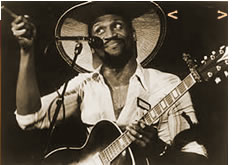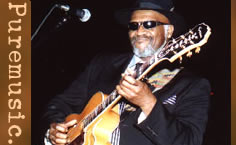 |
|||||
 |
|||||
A Conversation with Taj Mahal (continued)
PM: As regards the spiritual side of life, do you have a certain approach or personal inclinations?
TM: I'm open. I've always been. Although my mother was raised Baptist and I had a tremendous amount of gospel music in the house, my father was not connected to organized religion in any kind of way, except when my mother went to church and sang, that's when we went to church, to hear her sing. As kids growing up, we were allowed to go to any kind of church we wanted to, so I have a very open feeling toward that type of spirituality. In terms of organized religion, I don't think it's a bad idea. But I'll find my own way there. I find something in all of the spiritual pursuits and religious pursuits that works for me, so I'm open.
PM: You bought up Lao Tzu and Confucius, so I wondered...
TM: Oh, yeah. Oh, I could keep going, man. I mean, I was lucky enough when the 60s came along, a lot of this information was out there, and I wasn't the only person that was looking at this stuff. And I happened to be where there was information coming in. A lot of people didn't get that information. They just got, "Oh, this is a bunch of hippies." They didn't really think about what they were reading, or wonder "Why did they go where they went, and what did they think?" They didn't see what they were trying to do as people. So, yeah.
PM: Are there many musical compadres in your life that have been there since the early days and still remain?
TM: Yeah, some people from back in Springfield where I played. I mean, I've lost a few of those. My guitar teacher, who was probably about six months older than I am, when I first heard guitar playing close up by somebody who was a contemporary of mine--I lost him, oh, about a year ago. And the Nichols family, who lived up the block, who I used to hang out with, I run into them all the time here in New York. Well, Billy Nichols is here, and he was the one who wrote that B. T. Express song called "Do It Until You're Satisfied, Do It."
PM: Oh, what a great song!
TM: Yeah, well that was my partner that I walked to school with every morning. His family, they always said they were from Clarksville, Mississippi, but they were really from Stovall, Mississippi, from out there where Muddy Waters was working, right out there by the Stovall Plantation.
PM: Wow.
TM: But I didn't know this until we did this book a few years ago. And then they talked to Billy Nichols. But his brother, Ernest, and Junior and them, Junior Nichols and them, those cats was like--they played the real Mississippi blues. And it was just the music from down South to us. It wasn't musically especially like The Mississippi blues, as played by Nehemiah Skip James from Bentonia, Mississippi, and the D-minor tuning. It was nothing like that. It was just like, "These cats play the blues. Hey, man, how you tuning that guitar?" "Oh, I tunes it at C-natural." "Oh, okay." That music, it was so intense for me to feel it. It was the real deal. It's like something going on that really attracts you. So those are about it. Then Garland Netwiz was another guy that played around, I played a little bit of music with around in those days. Sheldon Leff--Garland was a guitar player, Sheldon Leff was a keyboard player. He's still around. I think his cousin Kenneth is around. In fact, both of them were excellent keyboard players. Various doo-wap groups who've moved on through the years to become something else, those guys are around.
PM: But you still retain ties to some of the earliest music guys in your life.
TM: Yeah, well, some of them are not here in this visible form, so...
PM: Yeah.
TM: But they're still alive in my mind, and the sound that they pass forth to me is there, and I'm always hearing something. We're really fortunate we did record a lot of stuff. I mean, us as a culture. And there's a lot of stuff that never was released that, my God, you go like, "Who made the decision not to have this out here?" But fortunately, if you know what you're looking for, these days you can really enjoy making the kinds of collections of music that you want, and you don't have to suffer the one or two great songs and then the rest of it's filler on a twenty-dollar CD.
PM: Some of your first landmark recordings for Columbia just got reissued, right?
TM: Yeah. Over the last six or seven years they have been. And more and more, I think people are just now coming around to it after all this time--because the stuff has been out. I mean, it's been at least a couple years since we re-released all that. And I did a lot of work on restructuring the covers like they were supposed to be. You get an opportunity to see what the record company did as opposed to what my original idea was for the cover to look like. And then, let's see, Stanley Crouch and Keb Mo both do some writeups in the re-released stuff on Sony. And then there's stuff that's re-released on Warner Brothers. And they're always pumping stuff around. There are a few of these not-so-good-companies, and I won't mention their names, that just manage to get a hold of some stuff and put it out around the world. And I think there's a pickup on it every now and then. It keeps peaking whenever something happens, and everybody all of a sudden goes, "Oh, yeah, wow, Taj Mahal," it gets bumped up again. But yeah, that stuff is out. It is. And it's very good. I'm glad. And it's actually been out on CD for a while, but I didn't realize that a lot of people didn't know it.
PM: Yeah. And a website really helps bring all that info together.
TM: Yeah, it sure does. continue